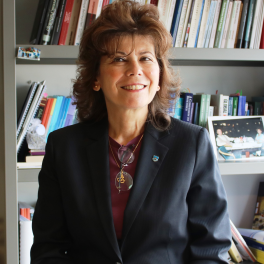Rapor 1
Prof. Dr. Yeşim Işıl Ülman who is from Acıbadem University, History of Medicine and Ethics Department of our School of Medicine, was invited for a conference at the Orient Institut Beirut (OIB) in Lebanon, Prof. Dr. Ülman gave a speech, on March 17, 2022 with her presentation titled "Vaccine Applications in the Ottoman Empire in the 19th Century", and it was also published on the internet. Prof. Dr. Ülman discussed the issue of vaccine production, promotion, distribution within a century, dissemination and institutionalization of vaccination in society since the foundation of the modern School of Medicine, which was opened in 1827 and was fundamentally restructured in 1838. Addressing the issue in the context of social change created by the renewal and modernization adopted as a state policy at the beginning of the 19th century in the Ottoman Empire, Prof. Dr. Ülman mentioned that the established policies and strategies led to a new administrative structure, a new judicial mechanism, the establishment and implementation of a new education system in society. Prof. Dr. Ülman stated that this social change caused the emergence of a modern institutionalization and professionalization process in medical education as a result of the creation of a modern institutional structure in one of the higher educational institutions, the creation of a theoretical and practical medical education curriculum of a modern nature, the training of candidates of physicians with innovative methods and the allocation of resources for this
Prof. Dr. Ülman discussed this process starting from the production, distribution, promotion of the vaccine in the society, organization of vaccination, training of health professionals, established within the School of Medicine in Istanbul. In the late Ottoman society, in parallel with the development of microbiology, bacteriology, public health disciplines, Prof. Dr. Ülman, who exemplified epidemics, fight against infectious diseases, public health measures, embodied methods such as quarantine, disinfection, vaccination, its transformative effects on medical education, health institutions, trained human power, and drew attention to the reactions and hesitations that emerged against these measures and strategies. Conference, modernization and modernity issue, forward and backward steps, was analyzed critically as a result of the ongoing social change process.
Orient Institut Beirut is an independent academic research center that carries out scientific projects in the fields of human sciences, sociology, politics, science, history, anthropology, literature and art in Europe, Middle East and North Africa for sixty years under the German Max Weber Stiftung. Like the peer institution Orient Institut Istanbul, it supports long-term and short-term, international and interdisciplinary research within the scope of doctoral and post-doctoral studies. Orient Institut Beirut, which operates in a building restored from an Ottoman mansion, offers researchers the opportunity to introduce, discuss, share and publish a rich library, seminars, conferences, symposiums and scientific projects
(Source: Yesim Isil Ulman, Galatasaray Tibbiyesi, the Beginning of Modernization in Medicine in the Late Ottoman Empire, Bilgi Univ Publ Istanbul 2017)



